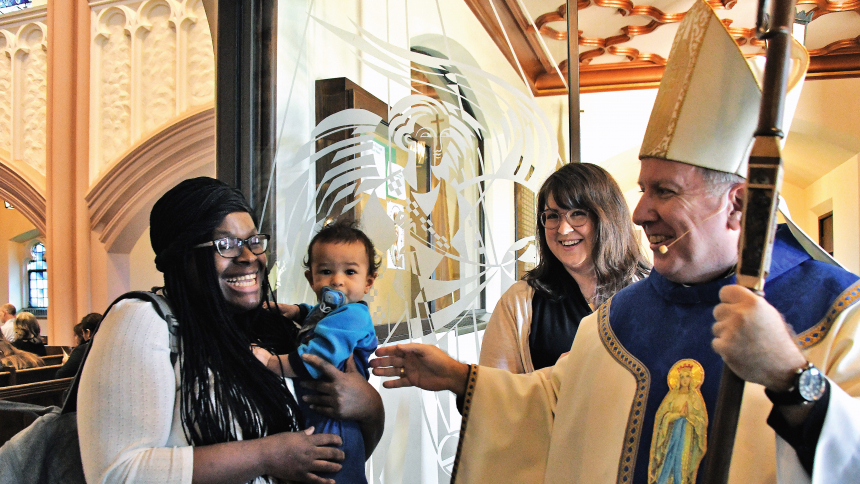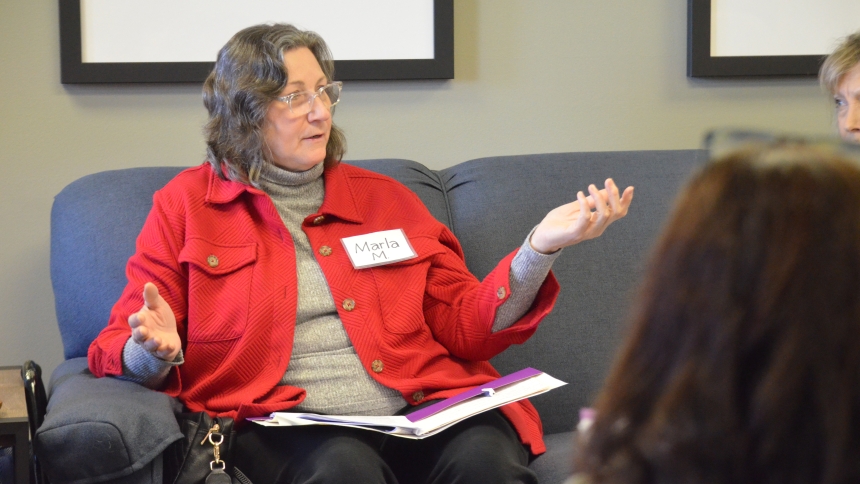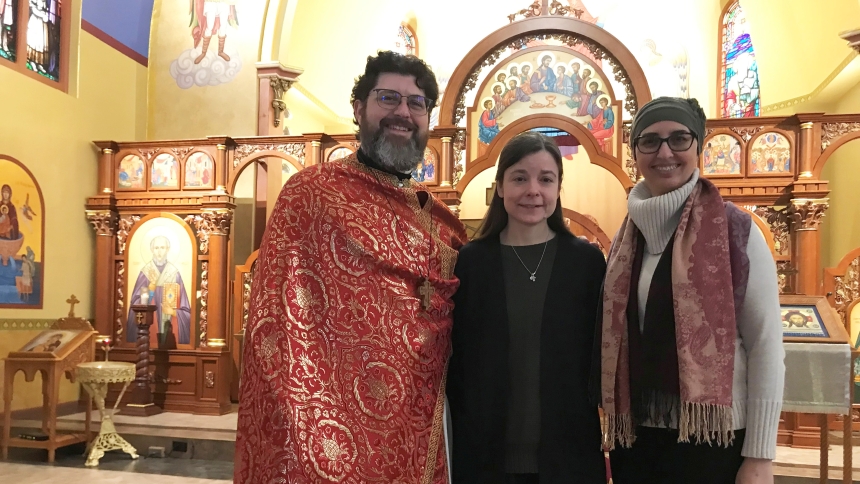
When we are nourished and renewed by the Eucharist, we should allow ourselves to be drawn ever more to share the love of Jesus with others in word and deed. True Eucharistic revival means that, having received the Body of Christ, we, His Body the Church, are compelled to reach out to others as agents of His mercy.
That’s what we are seeking to fulfill in the Diocese of Gary through our Diocesan Day of Service on Saturday, Aug. 17 which begins at the Cathedral. While this has been scheduled as a post-National Eucharistic Congress activity, one need not be present at the Cathedral to be renewed in exercising the works of mercy in our daily lives.
A few years back, Pope Francis dedicated his weekly Wednesday audience talks to the spiritual and corporal works of mercy as follows:
Jesus, in his words and actions, is the Incarnation of Mercy…. He, in return, taught his disciples: “Be merciful, even as your Father is merciful” (Lk 6:36)… it is not enough to experience God’s mercy in one’s life; whoever receives it must also become a sign and instrument for others. Mercy, therefore, is not only reserved for particular moments, but it embraces our entire daily existence.
How can we, therefore, be witnesses of mercy? We do not think that it is done with great efforts or superhuman actions. No, it is not so. The Lord shows us a very simple path, made by small actions which, nonetheless, have great value in his eyes, to the extent to which he has told us that it is by these actions we will be judged.
… Jesus says that every time we give food to the hungry and drink to the thirsty, clothe the naked and welcome the foreigner, visit the sick or imprisoned, we do the same to him (cf. Mt 25:31-46). The Church calls these actions “corporal works of mercy”, because they assist people with their material necessities.
There are also, however, seven other works of mercy called “spiritual”, which pertain to other equally important needs, especially today, because they touch the person’s soul, and often create the greatest suffering. We certainly remember a phrase which has entered into the common language: “Bear wrongs patiently”. And there are troublesome people! It might seem like a minor thing which makes us smile, but instead contains a feeling of profound charity; it is the same for the other six [spiritual works of mercy], which are good to remember: counsel the doubtful, instruct the ignorant, admonish sinners, console the afflicted, pardon offenses, pray to God for the living and the dead. These are daily things!
… Often it is the people closest to us who need our help. We should not go out in search of some unknown business to accomplish. It is better to begin with the simplest, which the Lord tells us is the most urgent. In a world which, unfortunately, has been damaged by the virus of indifference, the works of mercy are the best antidote. In fact, they educate us to be attentive to the most basic needs of “the least of these my brethren” (Mt 25:40), in whom Jesus is present. Jesus is always present there. … It recalls to mind the words of St Augustine: … “I fear the Lord passing by”, and I do not notice him; I fear that the Lord may pass before me in one of these little people in need, and I do not realize that it is Jesus. I fear that the Lord may pass by without my recognizing him! … we are often distracted, indifferent, and when the Lord closely passes us by, we lose the opportunity to encounter him. The works of mercy reawaken in us the need, and the ability, to make the faith alive and active with charity.
(POPE FRANCIS GENERAL AUDIENCE St Peter's Square Wednesday, 12 October 2016.)
May we each find simple ways to be missionary disciples who share the love of our Eucharistic Lord through our works of mercy.
Your servant,
Most Reverend Robert J. McClory
Bishop
Diocese of Gary
Cuando somos alimentados y renovados por la Eucaristía, debemos dejarnos atraer cada vez más a compartir el Amor de Jesús con los demás, de palabra y de obra. El verdadero Avivamiento Eucarístico significa que, habiendo recibido el Cuerpo de Cristo, nosotros, su Cuerpo, la Iglesia, nos sentimos impulsados a llegar a los demás como agentes de su misericordia.
Eso es lo que estamos tratando de cumplir en la Diócesis de Gary a través de nuestro Día Diocesano de Servicio el sábado 17 de agosto que comienza en la Catedral. Si bien esto se ha programado como una actividad posterior al Congreso Eucarístico Nacional, no es necesario estar presente en la Catedral para renovarse en el ejercicio de las Obras de Misericordia en nuestra vida cotidiana.
Hace unos años, el Papa Francisco dedicó sus audiencias semanales de los miércoles a las Obras de Misericordia Espirituales y Corporales de la siguiente manera:
Jesús, en sus palabras y acciones, es la Encarnación de la Misericordia.... Él, a su vez, enseñó a sus discípulos: "Sean misericordiosos, como su Padre es misericordioso" (Lucas 6, 36) ... no basta con experimentar la misericordia de Dios en la propia vida; quien la recibe debe convertirse también en signo e instrumento para los demás. La misericordia, por tanto, no está reservada sólo a momentos particulares, sino que abarca toda nuestra existencia cotidiana.
¿Cómo podemos, por tanto, ser testigos de la misericordia? No pensemos que se hace con grandes esfuerzos o acciones sobrehumanas. No, no es así. El Señor nos muestra un camino muy sencillo, hecho de pequeñas acciones que, sin embargo, tienen un gran valor a sus ojos, hasta el punto de que nos ha dicho que por esas acciones seremos juzgados.
... Jesús dice que cada vez que damos de comer al hambriento y de beber al sediento, que vestimos al desnudo y acogemos al extranjero, que visitamos al enfermo o al encarcelado, hacemos lo mismo con Él (Mateo 25, 31 – 46). La Iglesia llama a estas acciones "Obras de Misericordia Corporales", porque ayudan a las personas en sus necesidades materiales.
Pero hay también otras siete Obras de Misericordia llamadas "Espirituales," que se refieren a otras necesidades igualmente importantes, sobre todo hoy, porque tocan el alma de la persona, y a menudo crean el mayor sufrimiento. Recordamos ciertamente una frase que ha entrado en el lenguaje común: "Soportar los males con paciencia." Sabemos que hay personas con dificultades. Podría parecer una cosa sin importancia que nos hace sonreír, pero en cambio encierra un sentimiento de profunda caridad; lo mismo sucede con las otras seis [Obras de Misericordia Espirituales], que es bueno recordar: aconsejar a quien lo necesita, instruir a los que no saben, corregir al que se equivoca, consolar a los afligidos, perdonar las ofensas, rogar a Dios por los vivos y por los difuntos. Son cosas de cada día.
... A menudo son las personas más cercanas a nosotros las que necesitan nuestra ayuda. No debemos salir en busca de algún asunto desconocido que cumplir. Es mejor empezar por lo más sencillo, que el Señor nos dice que es lo más urgente. En un mundo que, por desgracia, ha sido dañado por el virus de la indiferencia, las Obras de Misericordia son el mejor antídoto. De hecho, nos educan para estar atentos a las necesidades más básicas de "los más pequeños de estos mis hermanos" (Mateo 25, 40), en los que Jesús está presente. Jesús está siempre presente allí. ... Me recuerda las palabras de san Agustín: ... "Temo que el Señor pase por delante de mí," y yo no me dé cuenta; temo que el Señor pase por delante de mí en una de estas pequeñas personas necesitadas, y yo no me dé cuenta de que es Jesús. ¡Temo que el Señor pase por delante de mí sin que yo lo reconozca! ... a menudo estamos distraídos, indiferentes, y cuando el Señor pasa cerca de nosotros, perdemos la oportunidad de encontrarlo. Las Obras de Misericordia despiertan en nosotros la necesidad, y la capacidad, de hacer viva y activa la fe con la caridad.
(AUDIENCIA GENERAL DEL PAPA FRANCISCO Plaza de San Pedro Miércoles, 12 de octubre del 2016.)
Que cada uno de nosotros encuentre formas sencillas de ser discípulos misioneros que comparten el Amor de nuestro Señor Eucarístico a través de nuestras Obras de Misericordia.
Su servidor,
Reverendísimo Robert J. McClory
Obispo
Diócesis de Gary



